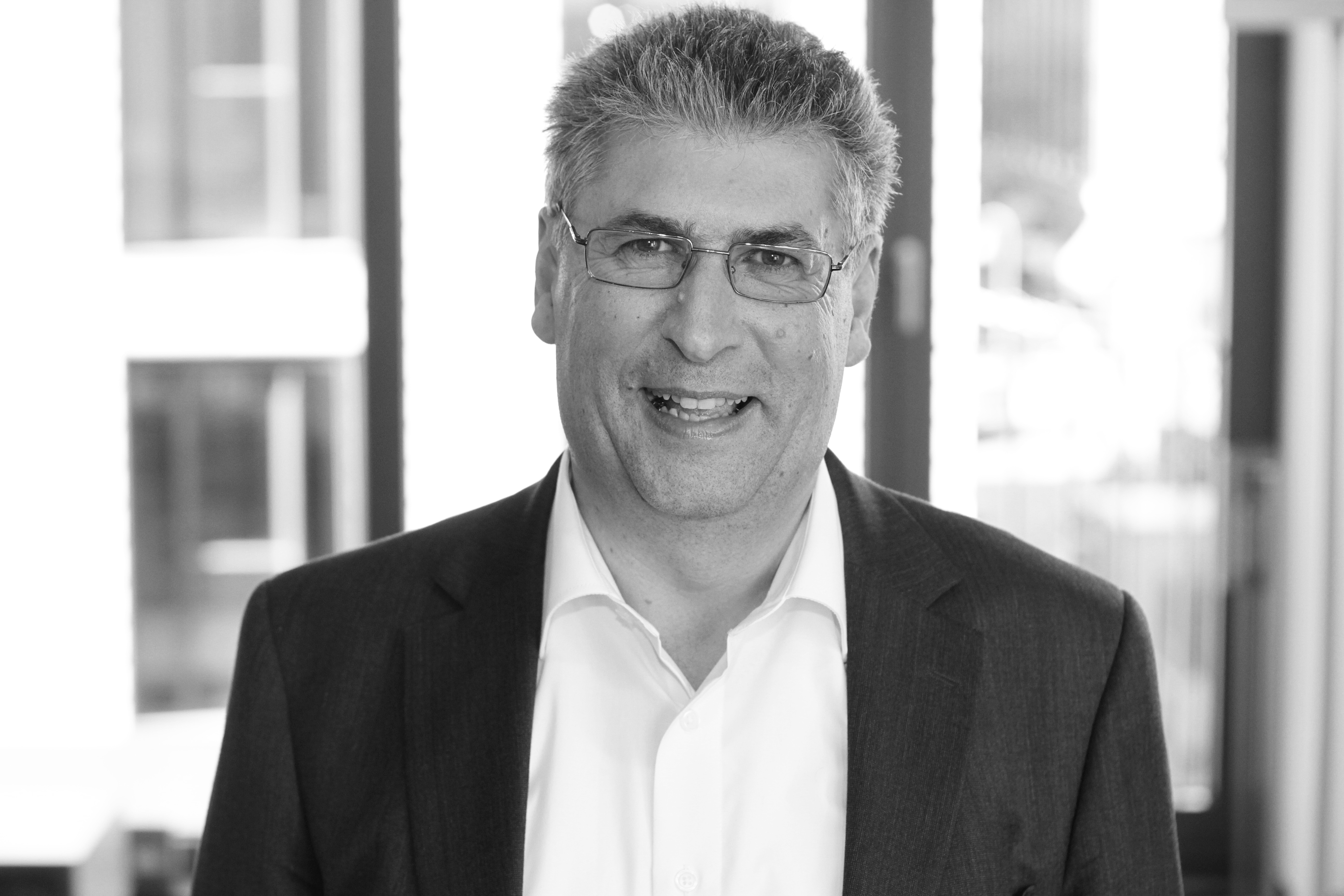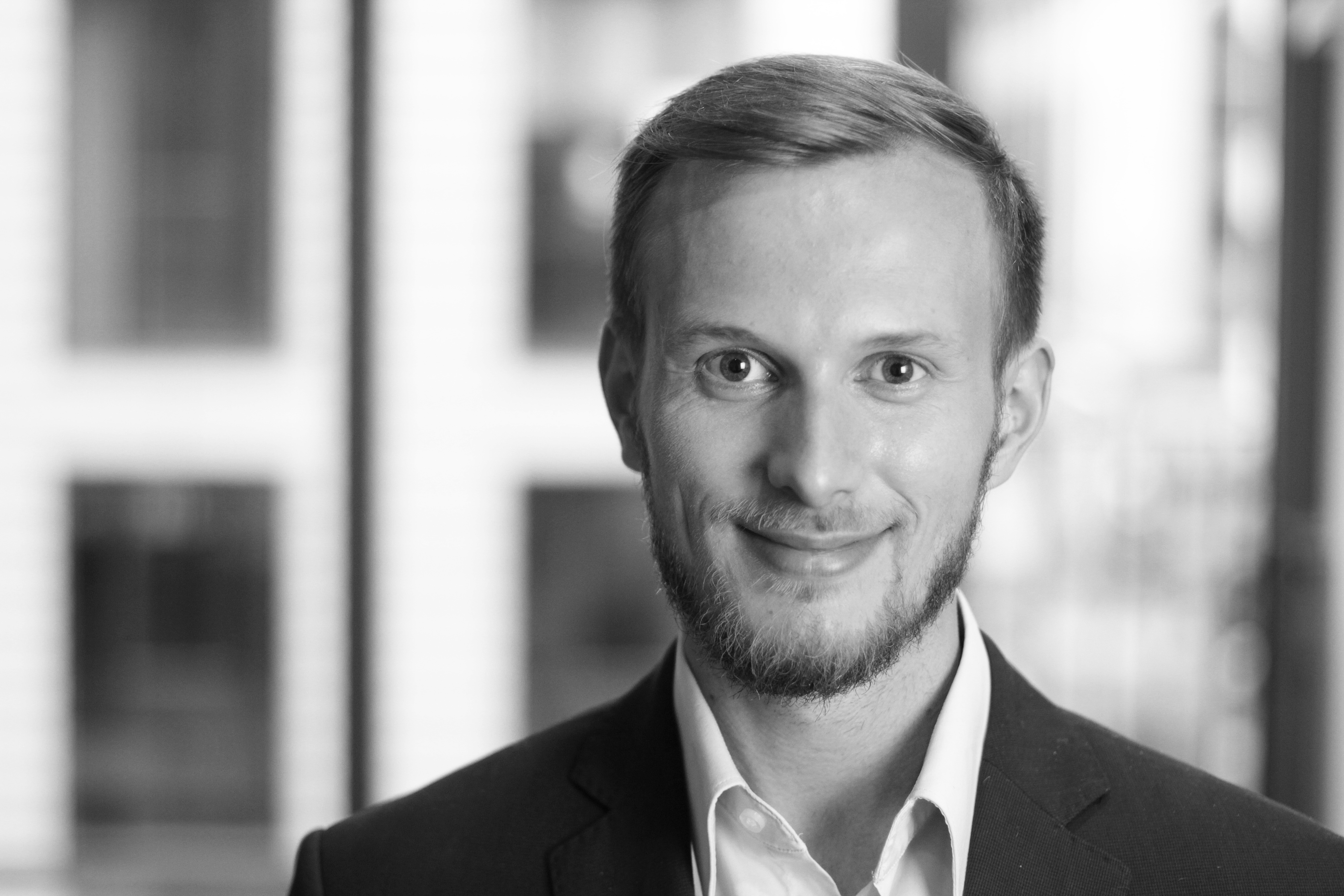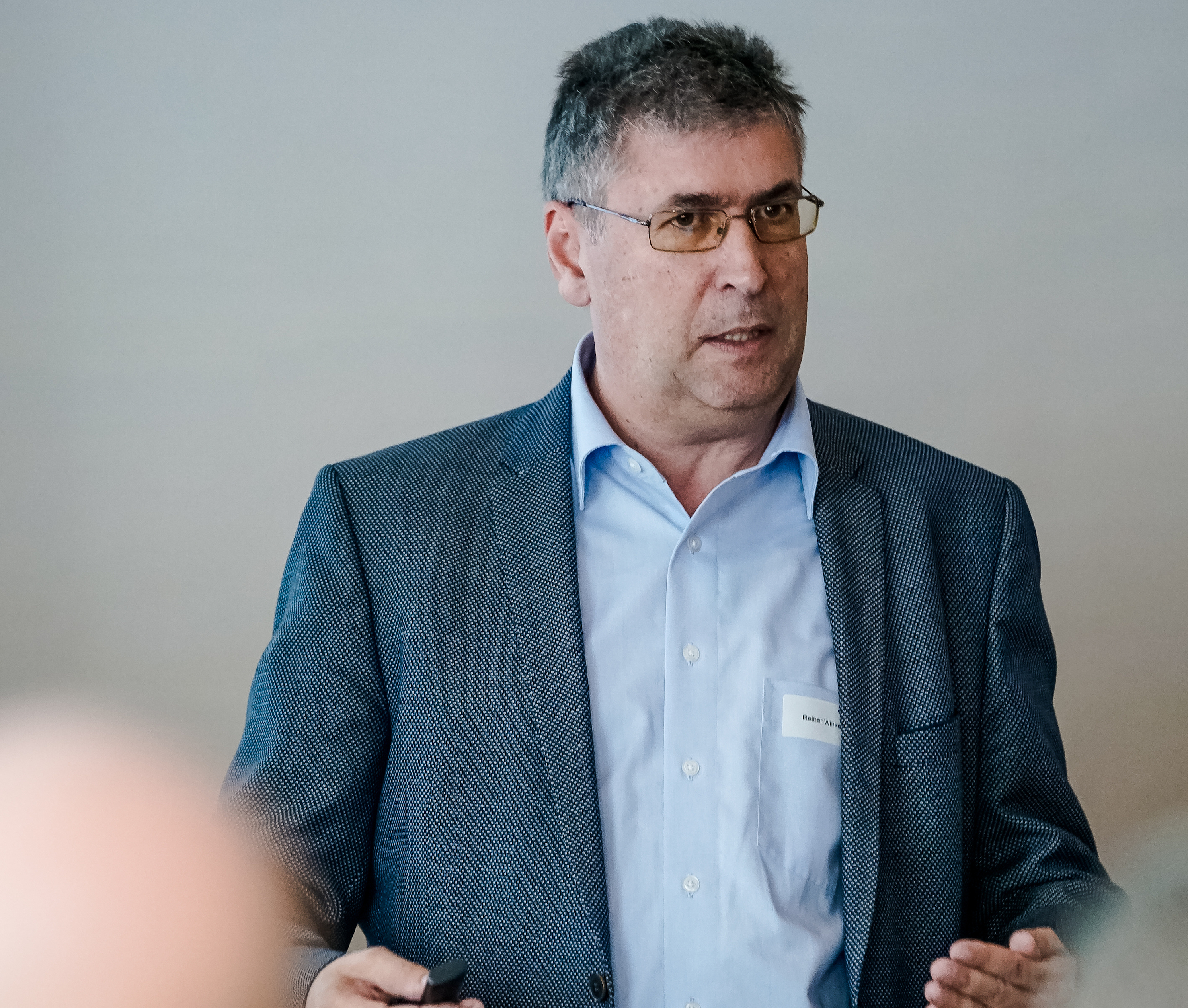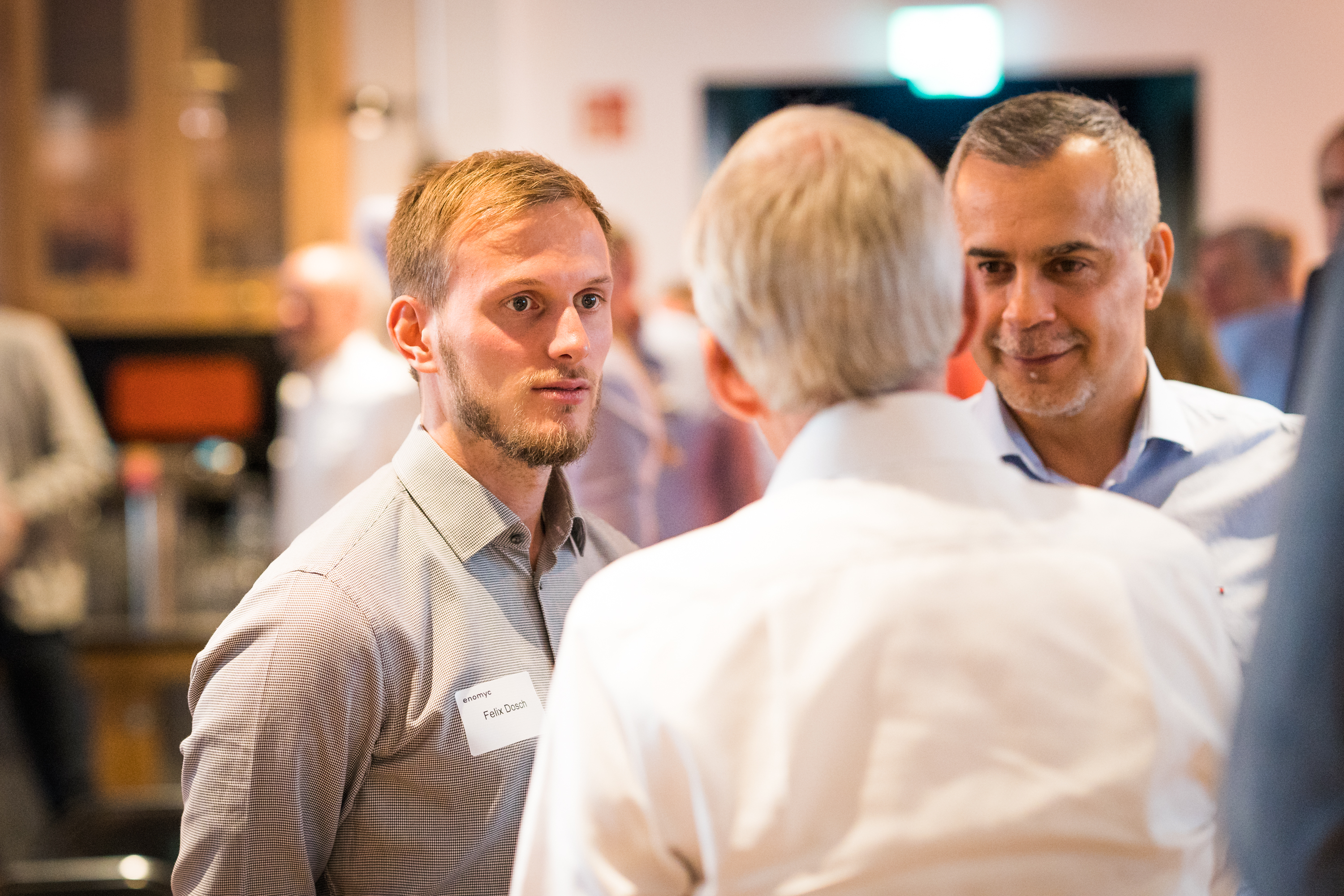The faces and stories of our consultants are many and varied. Hardly anyone’s career path that led them to enomyc is like another. We interviewed two of them:
Industrial engineer and senior consultant – at 26 years old, Felix Dosch has lived in Australia, worked in the USA, and studied in Taiwan. And 55-year-old Reiner Winkelbauer, business mathematician and partner, completed his master of science in 1990 in Syracuse, New York, before assuming responsibility for 600 employees and 70 million euros in sales as a CFO and managing director for many years.
Learn more
The most important lessons: advice they didn’t take and insights they want to share with prospective talents.
Mr. Dosch, did you always want to go into consulting?
No, when I was a kid, I wanted to be a detective.
Do you find detective elements in your everyday work today?
Definitely! I like to look at things with a magnifying glass, analyze, and get to the bottom of things. I also like to help and provide solutions.
How about with you, Mr. Winkelbauer? Would you say that you’ve fulfilled your career ambitions?
I wanted to be a teacher. “But if you do that,” they said then, “you’ll never get a job.” But I think, in a way, I have already followed my career aspiration. Teachers also act as advisers – only I don’t advise children and young people, but employees and companies instead.
You are a graduate in business mathematics who received your master of science degree in 1990 from Syracuse University in New York State. Which aspects of this are still of great importance today in your consulting activities?
From a consultant’s point of view, it is essential to follow the mind. My studies primarily provided me with knowledge of mathematics and business mathematics: the ability to create and follow logical relationships. Many problems can be solved logically.

What did you not learn during your studies, but that you need as a consultant?
The values of honesty, respect, and trust – my family gave me these values at an early age. They have always proven themselves.
Mr. Dosch, you are an industrial engineer and studied at the Technical University in Dresden.
Yes, but at the same time, I’ve always been very eager to get around. I was 18 when I was in Australia; later I completed an internship at VW in the USA, and then – just before my final thesis – a semester abroad in Taiwan. That provided me with a good basis for exploring Asia in general.
Why did you go abroad?
I believe one learns a lot of different things very quickly while traveling – I liked that very much. It is also something completely different to live in another country instead of just traveling through it. I had to deal with the language and the cultural differences. I experienced normal everyday life and, of course, the everyday problems that go along with it. I lived on my own money, which wasn’t always easy, but it provided me with an experience that I wouldn’t want to have missed out on and that went a long way in shaping me.
In retrospect, if you had chosen another career path, do you think that you would have still become a consultant at enomyc?
No.
Which specific experiences have proven to be indispensable to your work as a consultant?
It was always important to me to have a side job, even as a student during semester breaks. I’m from Stuttgart – for me it was obvious to work for automotive suppliers, for example at BOSCH on the assembly line. Turning, milling, welding – I can do it all. Is that still important today? No, but I understand something about manufacturing, and I understand how things work in production. At MAHLE, I recorded process requirements and work instructions, documented all machines in the plant, and thus also gained an understanding on the system side.

Now you are just 26 years old and a senior consultant at enomyc.
No question: it was a cold start! I came to the office on day one with my suitcase and had to go directly to a client – straight into project work.
Mr. Winkelbauer, in your career so far you have been a CFO in the pharmaceutical industry and the managing director and CFO of an aerospace group. At what point did you develop the desire to change over to the consultancy side?
Never. My image of business consultants was divided. “They may be very skilled rhetorically,” I thought, “but when it comes to bringing about real results, they fail.”
And today you are a partner at enomyc!
That’s right, I am. After many years as a CFO and managing director, I wanted to take a break – I had planned on just under a year. During that time, I cultivated my contacts and went to networking events. There, I found out about enomyc and met Philippe Piscol. I liked the company philosophy, the mission statement, the hands-on approach! For companies who want to be helped out of a crisis, then they are in good hands [with enomyc], and it will be done right. That was 2015. I have not at all regretted my decision to go into consulting, because where I’m acting in an advisory capacity, I’m making a difference!
Which areas appeal to you most in your function?
As I come from a controlling background, and financial management has been an integral part of my career, I am of course initially attracted to the finance department. I am also particularly interested in human resources, employee policy consulting, mentoring, and employee development. At the entrepreneurial level, succession planning is a major concern for me.
Mr. Dosch, were you consciously looking for a job in a business consultancy?
No, though I’ve always found consulting interesting. When I found out about enomyc through the founder of the QX network, I searched for trainee programs and attended assessment centers.
How was your first contact with enomyc and what impression did you get?
My first phone call was with Martin Hammer, the founder himself. I found it impressive to speak with him directly – without HR or project management being used as an intermediary. The conversation challenged me, but the tone remained informal and friendly throughout– completely different from what I knew from corporate environments. I loved that! I was also convinced by the holistic nature of consulting in medium-sized companies; in large companies you might see one or two individual departments as a consultant. If you advise medium-sized businesses, however, you are able to get a complete picture of the company – from production to finance, from sales to business.
What has been your greatest personal achievement at enomyc so far?
I have learned an incredible amount here – that is very important to me personally. One reason for this has been my mentor, Roland Nickerl, who was put on my side by enomyc from the beginning. I have learned a lot from him and have become increasingly self-sufficient. Currently, I am also doing further training as a restructuring consultant – the fact that this is offered by enomyc makes my work even more attractive and clearly increases my understanding of the job.
What has been the best lesson so far that you have drawn for yourself in cooperation with your mentor?
On the one hand, “leading by example” – while on the other hand, keeping an eye on the big picture. I learned from him to have a goal in mind in advance – even if the path is not yet clear – and to inspire all the people involved to go along with it. It’s great to see how a company’s workforce pulls together in the same direction! That’s what makes this job so fun. My mentor is a living example of this for me.
Mr. Winkelbauer, what do you particularly like about working with the young consultants at enomyc?
I keep learning through them. I always take something with me from my work and conversations with them. They are also ahead of us older consultants in many areas! Let’s take digitization as an example: I did not grow up digitally – the younger generation was practically born with digitization in body and mind.
How emotional do you feel about your job?
I see business consultancy as a highly human experience. It’s bitter when you get to know the people in a company personally, when you know how well they do their job, but it’s not enough to keep their position – you take that home with you. But falling into a “false helper syndrome” is also harmful to the company.
How much emotion do you think a business consultant can handle?
If a certain level is reached, clear consequences must be drawn – also emotionally. I like to remind myself that the entire workforce would have to be made redundant if certain restructuring or reorganization measures did not take place – say 20% job cuts. My job as a consultant is ultimately to help a company survive in the long term. So, I also draw emotional boundaries and act logically.
What was one of the most difficult choices you had to make?
Restructuring: so often personnel measures are part of it, personal fates depend on it. Whether as an entrepreneur, managing director, or consultant, this is always the most unpleasant part.
 I’m sure you have both experienced many highlights. Which ones can you tell us about, Mr. Winkelbauer?
I’m sure you have both experienced many highlights. Which ones can you tell us about, Mr. Winkelbauer?
These are the cases that bring the greatest joy to all involved! For example, I have been responsible for the strategic restructuring of companies that have seen a 20% increase in personnel. In general, advising family businesses that find themselves in extremely critical situations and consciously want help – guiding such businesses into a secure future – that is also very satisfying for me.
Looking back on your career path, was there any supposedly good advice that you did not listen to, Mr. Dosch?
Yes, in the past I was advised against going abroad for an internship – that was just before a promotion within a company. My boss at the time thought it was crazy to let the career opportunity in the company slip through my fingers. My experience abroad was more important to me though.
Do you agree, Mr. Winkelbauer? In your opinion, what educational and life paths should young talents invest in?
I am glad and think it is good that Mr. Dosch made the decision he did. I think that if young talents have opportunities and possibilities to go abroad, to get to know the diversity of different cultures and foreign languages, then they should definitely take them! It takes courage. Hesitating doesn’t get anybody anywhere. Whether as an au pair, a trainee, or a student, the experience and social skills gained abroad will benefit young talents in terms of openness, tolerance, flexibility, maturity, and subtlety for the rest of their lives. These are all important qualities for consultants. We do not necessarily learn them during our studies or in environments that are too familiar to us.
Mr. Dosch, what advice would you like to give prospective talents today?
I’m a career changer myself, but I love the job! I think this is a basic requirement for being able to work as a business consultant. It is also good to know that analyses and the implementation of measures are indispensable, but being a business consultant also relies heavily on interpersonal skills and empathy. The profession thrives on interaction with people and understanding their situation.
What do you think, Mr. Winkelbauer?
I agree. You can’t do it without emotions, without lifeblood. Good consultants get involved with people: they don’t impose anything on them. They take them seriously, engage in discussion, and also have the ability to inspire people and get them on board with their vision. But all of that is still not enough. At the end of the day, the numbers, data, and facts speak clearly. The long-term success of a company therefore depends on the interaction of both worlds.


